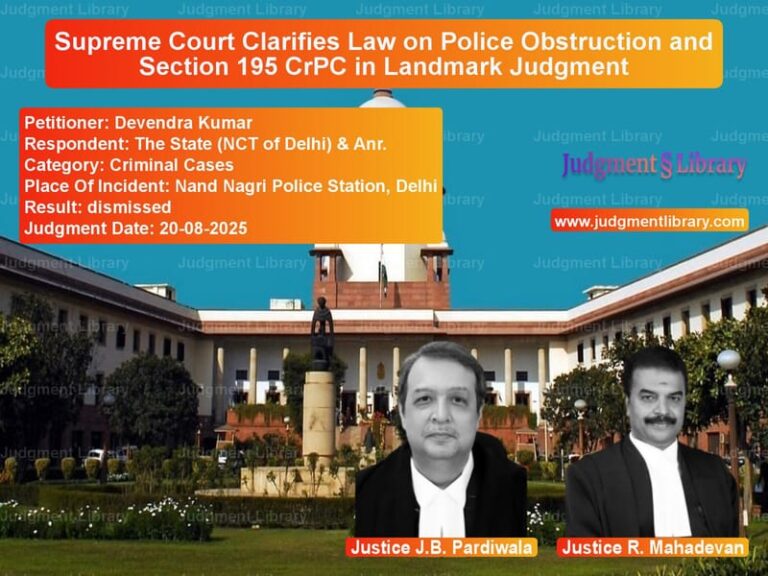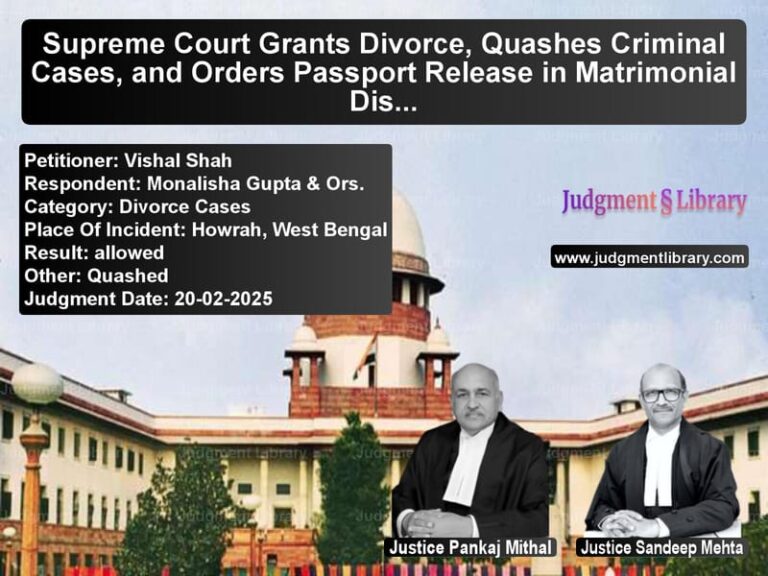Mortgage Dispute Over Land Ownership: Supreme Court Rules in Favor of Defendant
The Supreme Court of India recently delivered a critical judgment in the case of Leela Agrawal vs. Sarkar & Anr., concerning a dispute over land ownership arising from a mortgage agreement. The ruling overturned the decisions of the Trial Court and the High Court of Chhattisgarh, reaffirming that a mortgage by conditional sale must be enforced as per its terms.
Background of the Case
The case revolved around a two-acre agricultural land located in Manendragarh, District Korea, Chhattisgarh. The plaintiff, Sarkar, was the undisputed owner of this land. Facing financial difficulties, she mortgaged the land to the defendant, Leela Agrawal, for ₹75,000 on October 17, 1990. The mortgage deed specified that if the plaintiff failed to repay ₹1,20,000 (including interest and other charges) within three years, the mortgage would automatically convert into an absolute sale.
Key Events
- In 1993, the plaintiff attempted to repay ₹1,20,000 to redeem the mortgage, but the defendant refused, asserting that the land had already been converted into an absolute sale as per the mortgage terms.
- The plaintiff then filed Civil Suit No. 26-A/2001 before the Additional District Judge, Manendragarh, seeking redemption of the mortgage and a declaration that the defendant’s claim of ownership was invalid.
- The Trial Court ruled in favor of the plaintiff, holding that the mortgage clause converting the agreement into a sale was a clog on the equity of redemption and ordered redemption by payment of ₹1,20,000.
- The defendant appealed to the High Court of Chhattisgarh, which upheld the Trial Court’s decision.
- After the High Court dismissed a review petition in 2019, the defendant approached the Supreme Court.
Legal Arguments
Defendant’s Arguments
The defendant’s counsel argued:
- The mortgage deed explicitly stated that failure to repay within three years would convert the mortgage into an absolute sale, making the defendant the rightful owner.
- The plaintiff had failed to make the payment within the stipulated period, making the conversion legally binding.
- The courts below erred in treating the agreement as a simple mortgage rather than a mortgage by conditional sale under Section 58(c) of the Transfer of Property Act, 1882.
- The plaintiff’s continued possession of the land was permissive and did not affect the legal consequences of the agreement.
- The plaintiff’s case was weak because she never testified in court, relying instead on her husband as a power of attorney holder.
Plaintiff’s Arguments
The plaintiff’s counsel contended:
- The mortgage condition converting the agreement into a sale was a clog on the equity of redemption and unenforceable.
- The plaintiff had been in possession of the land throughout, cultivating it, which indicated that the transaction was a simple mortgage.
- The defendant’s refusal to accept payment in 1993 was unlawful.
- Under Section 165 of the Chhattisgarh Land Revenue Code, 1959, the mortgage was void because it reduced the plaintiff’s landholding below the legal limit.
Supreme Court’s Analysis
1. Interpretation of Section 58(c) of the Transfer of Property Act
The Court examined whether the agreement qualified as a mortgage by conditional sale. The judgment outlined the following key elements:
- There must be an ostensible sale of the property.
- The sale must be subject to a condition that it becomes absolute upon default in payment.
- The condition must be included in the same document as the sale.
The Supreme Court found that the mortgage deed met all these requirements, stating:
“All essential ingredients of a mortgage by conditional sale under Section 58(c) are satisfied in this case.”
2. Equity of Redemption and Clog Doctrine
The Supreme Court rejected the lower courts’ view that the condition converting the mortgage into a sale was a clog on the equity of redemption. It clarified that when parties freely agree to a mortgage with a clear condition for automatic sale upon default, courts should not interfere.
The Court ruled:
“The condition was an integral part of the contract and not an unfair restriction on redemption.”
3. Plaintiff’s Continued Possession
The Court observed that the plaintiff’s possession of the land did not negate the nature of the agreement. The defendant had permitted her to remain on the land temporarily, which did not invalidate the mortgage terms.
4. Non-Appearance of the Plaintiff
The Court noted that the plaintiff did not personally testify, instead relying on her husband. It stated:
“The failure of the plaintiff to testify weakens her claim, as her allegations regarding the defendant’s refusal to accept repayment remain unsubstantiated.”
5. Application of Section 165 of the Chhattisgarh Land Revenue Code
The plaintiff had argued that the mortgage was void because it violated landholding restrictions. However, the Supreme Court found no concrete evidence supporting this claim and ruled that the restriction did not apply.
Read also: https://judgmentlibrary.com/legal-interpretation-of-settlement-and-gift-deeds-in-property-disputes/
Final Judgment
The Supreme Court allowed the appeal and set aside the judgments of the Trial Court and High Court, ruling:
- The mortgage deed was valid and enforceable as a mortgage by conditional sale.
- The plaintiff’s failure to repay within the stipulated period meant the land legally belonged to the defendant.
- The Trial Court’s order for redemption was incorrect.
- The defendant could pursue legal action to recover possession.
- The plaintiff must vacate the land, and the deposited ₹1,20,000 should be refunded to her.
Implications of the Judgment
The ruling reinforces key principles in mortgage law:
- Enforceability of Conditional Sale Clauses: Courts should uphold mortgage terms when freely agreed upon by the parties.
- Protection Against Unjust Enrichment: Borrowers cannot use legal loopholes to retain both land and loan amounts.
- Burden of Proof in Mortgage Disputes: Plaintiffs must personally testify to substantiate their claims.
- Clarity on Equity of Redemption: Only unreasonable restrictions on redemption are considered invalid.
This judgment provides a crucial precedent for future disputes over mortgage agreements, ensuring contractual obligations are enforced as per their terms.
Petitioner Name: Leela Agrawal.Respondent Name: Sarkar & Anr..Judgment By: Justice Vikram Nath, Justice Prasanna B. Varale.Place Of Incident: Manendragarh, Chhattisgarh.Judgment Date: 19-11-2024.
Don’t miss out on the full details! Download the complete judgment in PDF format below and gain valuable insights instantly!
Download Judgment: leela-agrawal-vs-sarkar-&-anr.-supreme-court-of-india-judgment-dated-19-11-2024.pdf
Directly Download Judgment: Directly download this Judgment
See all petitions in Property Disputes
See all petitions in Specific Performance
See all petitions in Damages and Compensation
See all petitions in Contract Disputes
See all petitions in Judgment by Vikram Nath
See all petitions in Judgment by Prasanna Bhalachandra Varale
See all petitions in allowed
See all petitions in Quashed
See all petitions in supreme court of India judgments November 2024
See all petitions in 2024 judgments
See all posts in Civil Cases Category
See all allowed petitions in Civil Cases Category
See all Dismissed petitions in Civil Cases Category
See all partially allowed petitions in Civil Cases Category







